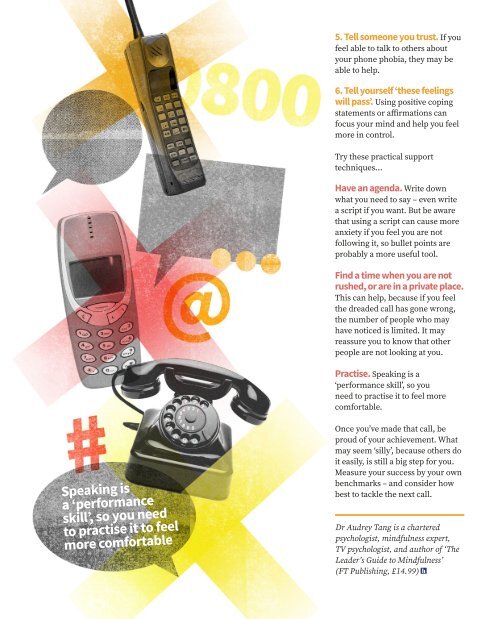You also want an ePaper? Increase the reach of your titles
YUMPU automatically turns print PDFs into web optimized ePapers that Google loves.
5. Tell someone you trust. If you<br />
feel able to talk to others about<br />
your phone phobia, they may be<br />
able to help.<br />
6. Tell yourself ‘these feelings<br />
will pass’. Using positive coping<br />
statements or affirmations can<br />
focus your mind and help you feel<br />
more in control.<br />
Try these practical support<br />
techniques…<br />
Have an agenda. Write down<br />
what you need to say – even write<br />
a script if you want. But be aware<br />
that using a script can cause more<br />
anxiety if you feel you are not<br />
following it, so bullet points are<br />
probably a more useful tool.<br />
Find a time when you are not<br />
rushed, or are in a private place.<br />
This can help, because if you feel<br />
the dreaded call has gone wrong,<br />
the number of people who may<br />
have noticed is limited. It may<br />
reassure you to know that other<br />
people are not looking at you.<br />
Practise. Speaking is a<br />
‘performance skill’, so you<br />
need to practise it to feel more<br />
comfortable.<br />
Speaking is<br />
a ‘performance<br />
skill’, so you need<br />
to practise it to feel<br />
more comfortable<br />
Once you’ve made that call, be<br />
proud of your achievement. What<br />
may seem ‘silly’, because others do<br />
it easily, is still a big step for you.<br />
Measure your success by your own<br />
benchmarks – and consider how<br />
best to tackle the next call.<br />
Dr Audrey Tang is a chartered<br />
psychologist, mindfulness expert,<br />
TV psychologist, and author of ‘The<br />
Leader’s Guide to Mindfulness’<br />
(FT Publishing, £14.99)

















